
English (961)
Children categories
Sir Fazle Hasan Abed receives Princeton honorary degree
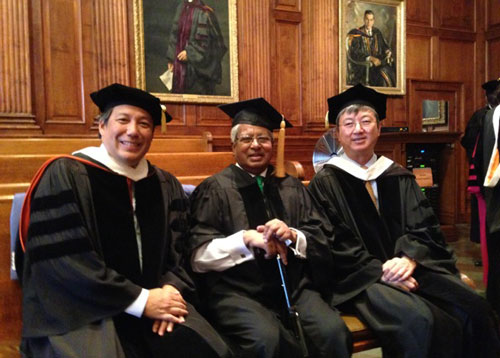
05 June 2014, Dhaka. BRAC founder and Chairperson, Sir Fazle Hasan Abed, has been awarded an honorary Doctor of Laws degree by Princeton University on 3 June 2014. Princeton President Christopher L. Eisgruber awarded Sir Fazle in the historic Nassau Hall of the university. This honorary doctoral degree was conferred upon five people for their contributions to human rights, public life, business, the humanities, education and engineering. Former U.S. secretary of state, Madeleine K. Albright is amongst the other four recipients. About 10,000 students and guests attended the ceremony.
In its official citation, the university commended Sir Fazle’s commitment to poverty alleviation, calling BRAC, which he founded in 1972, “a profoundly effective and universally admired organisation committed to alleviating poverty for millions worldwide.” The citation from Princeton also said, “His organisational and leadership skills, combined with his ceaseless commitment to uplifting the less fortunate, have led to innovative and enduring programmes in economic development, education and healthcare. He has created a model of how to have a lasting impact on those in need.”
BRAC is a global leader in creating opportunities as a means to end poverty. With more than 100,000 employees, it is the world's largest non-governmental organisation, touching the lives of an estimated 135 million people in 12 countries using a wide array of antipoverty tools such as microfinance, education, healthcare, legal rights training and more.
Sir Fazle has received numerous other honorary degrees including Doctor of Humane Letters from Yale University (2007); Doctor of Laws from Columbia University (2008); Doctor of Letters from the University of Oxford; In 2009, he was appointed Knight Commander of the Most Distinguished Order of St. Michael and St. George (KCMG) by the British crown in recognition of his services to reducing poverty in Bangladesh and internationally.
Commemoration of 15 years of anniversary of Acid Survivors Foundation (ASF)

10 June 2014, Dhaka. Acid Survivors Foundation (ASF) observed its 15th anniversary with the slogan “15 years of success and fight to prevent acid violence” on 31 May 2014. ASF has been working in preventing and raising awareness on acid violence since 1999. The organisation stepped into 16 years of its founding in May this year. Acid violence has declined as a result of a collaborative effort, ASF believes, but the organisation strives to bring the rate of acid violence down to zero.
The programme started with a welcome note from Dr Iftekharuzzaman, Chairperson, Trustee Board, ASF. Selina Ahmed, Executive Director, ASF highlighted the achievement and obstacles that the organisation faced in 15 years of its journey.
The programme was held in the LGED auditorium of the capital. Present as chief guests were Dr Shamanto Lal Sen, Plastic Surgeon and a founding member of ASF; Advocate Salma Ali, Executive Director, Bangladesh National Women’s Lawyers Association; Selim Ahmed, Former Chairman of Unicef Staff Association; Abdul Quayum, Associate Editor, Prothom Alo; Mr. Asif Saleh, Senior Director, BRAC; Ferdousi Akter, representative of acid survivors, member, Board of Trustee, ASF.
ASF honoured a total of 29 organisations and individuals for their support and contribution over the years. Late Ivy Rahman, Dr Shamanto lal Sen, Abdul Quayum, Advocate Salma Ali and Asif Saleh were among the awardees.
Professor Momtaz Megum, Chairperson, Bangladesh National Women’s Association, accepted the award on behalf of Ivy Rahman. She expressed her gratitude and wished to continue working with ASF. Dr Shamanto Lal Sen in his speech, outlined the history of ASF and expressed his appreciation towards the acid survivors.
Advocate Salma Ali, in her speech said ASF can be considered an inspiration for acid survivor foundations around the world. She also stressed on the need for accountability from government in order to implement laws better.
Next to address was Asif Saleh, Senior Director, BRAC. He spoke of the resilience of acid survivors and how only in unity one can find the inspiration to work for change. He urged ASF to consider its future plans after it is done tackling acid violence.
The anniversary programme ended following cake cutting and cultural programme organised by survivors.
Sir Fazle Hasan Abed honoured with Leo Tolstoy International Gold Medal
02 June 2014, Dhaka. BRAC founder and chairperson, Sir Fazle Hasan Abed has been awarded the Leo Tolstoy International Gold Medal by The Russian Children Foundation (RDF) on the occasion of International Children’s Day on 1 June 2014. He received the award at Moscow's historic Bolshoi Theatre after a Gala concert for orphaned, disabled and disadvantaged children, where he was present as the Guest of Honour. About 11,000 children from all around the country gathered in Moscow to participate in this event.

Sir Fazle Hasan Abed receiving the Leo Tolstoy International gold medal award from the The Russian Children's Foundation's leader and famous writer, Albert A. Likhanov
The award was given by the organisation’s leader and famous writer, Albert A. Likhanov. Every year, the Russian Children's Foundation awards this medal to an outstanding humanist who has made a significant contribution to the education and care of children. Previous awardees include Mother Teresa, Albert Sabin (inventor of the oral polio vaccine), and Swedish children's writer, Astrid Lindgren. Upon receiving the award, Sir Fazle Hasan Abed said, “I thank the Russian Children Foundation for the honour they have shown me and BRAC. BRAC has been focusing on empowering people, particularly vulnerable women and children, and creating opportunities through education for the last three decades. I have great appreciation towards the work of RDF by which they are protecting countless underprivileged children in Russia.”
The Russian Children’s Foundation, the country’s first public organisation for the protection of children was formed in September 1991. It currently has 74 regional offices actively working to provide social assistance to needy children in Russia in cooperation with public authorities, businesses and other community organisations.
BRAC, established in 1972, is a development organisation dedicated to alleviating poverty by empowering the poor, and helping to bring about positive changes in their lives by creating opportunities for them. So far its work has touched lives of an estimated 135 million people all over the world.
BRAC Dairy and its innovative efforts highlighted in an international academic thesis
29 May 2014, Dhaka. Yoni Blumberg, a student of Carleton College in USA, has recently completed a thesis that uses BRAC Dairy as a case in point to study and analyse social enterprise strategies and the resulting impacts. The thesis looks into the many strategies that social enterprises use to create social and economic change; Blumberg traces how BRAC Dairy, in particular, is helping small farmers in Bangladesh, using innovative methods in different levels of its operations to tackle poverty. The writer identifies how Bangladesh, throughout the 1980s, imported nearly all of the pasteurized milk it consumed as a result of the domestic milk market being underdeveloped, and how it is an entirely different story today. BRAC Dairy’s use of business to address social needs finds well-researched evidence. A summary of Blumberg’s thesis can be found in the poster provided below.
Read more about the research and finidings
Seminar held on ‘Creating accessibility in transportation and road infrastructure for the disabled’
BRAC’s road safety programme held a seminar on ‘Creating accessibility in transportation and road infrastructure for the disabled’ on 6 May 2014, at BRAC Centre. It was a collaborative initiative between BRAC and BRTA.
Consultant in traffic planning and researcher of Lund University Helena Svensson, PhD gave a presentation on the topic. She identified insufficient footpath and a lack of arrangement for disabled people to get into public transport as major problems. She suggested that places like the parliament house, public parks and shopping malls in the capital should have special arrangements for disabled people to move freely. The guests present in the seminar emphasised on making proper law and enforcement for the disabled in transportation.
BRTA chairman Md Nazrul Islam said, “The Bangladesh government will soon start a ‘transport and traffic act’ in order to ensure accessibility of the disabled people in transportation.” Ahmed Najmul Hossain, director of BRAC’s road safety programme concluded the seminar saying, “this is the first initiative and we look forward to work with the government more on this issue to make a difference”.
Additional DIG of police Nazmul Haque, MD of Shohag transportation Md Faruk Talukder and director of CIPRB Dr AKM Fazlur Rahman was present amongst the guests.
A call for action to end malnutrition
Civil Society Alliance for Scaling Up Nutrition, Bangladesh (CSA for SUN) celebrated a “Global Day of Action” on nutrition with 18 other countries on 4 May 2014 at Spectra Convention Centre. Inaugurated in 2012 by UN Secretary General Ban Ki-moon, SUN is a unique movement founded on the principle that all people have a right to food and good nutrition. BRAC is facilitating Secretariat responsibility to achieve the objectives of SUN Movement.
The purpose of the Global Day of Action is to display the strong public support behind the nutrition issues of Bangladesh, and reflect this internationally. Art and quiz competitions were held in 14 districts across 7 divisions of Bangladesh in April. An art exhibition with the winning artwork from all 14 districts was displayed in the event.
“We must not allow under-nutrition to prevail and only with coordinated efforts we will be able to overcome malnutrition” said the chief guest of the event, State Minister for Ministry of Women and Children’s Affairs Meher Afroz Chumki, MP. Representative of World Food Programme Christa Rader and member of SUN Civil Society Network, Dr. Sultana Khanum attended the event as special guests. Dr. Michael Foley, Director, Save the Children & Executive Member of CSA for SUN, Dr. Rukshana Haider, Chair, CSA for SUN, Bangladesh, Kaosar Afsana, Director, BRAC & Member Secretary, CSA for SUN were also present.
Within the SUN Movement, national leaders are prioritizing efforts to address malnutrition. With a shared understanding that many factors impact nutrition, each of us has a unique contribution to make. Together we are capable of achieving what none of us can do alone.
BRAC (Learning Division) signed a MOU with the Department of Women Affairs (DWA)
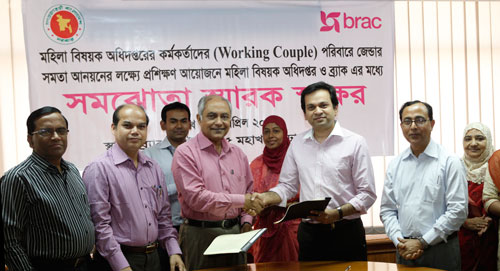
The Department of Women Affairs (DWA), Government of Bangladesh and BRAC has signed an MOU on 24 April 2014, aiming to sensitise DWA’s working couple groups in gender equality to create a sharing culture in their family through training. BRAC Learning Division and GJD are collaboratively working with the project, which will continue for one year from the signing date of the MOU. Md Ashraf Hossain, Director General, DWA and Asif Saleh, Senior Director, Strategy Communications and Capacity, BRAC signed the MOU from their respective ends.
MoU signing ceremony between BRAC and Ministry of Posts, Telecommunication and IT
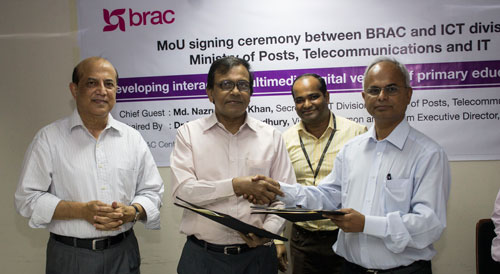
BRAC signed a MoU with the ICT division of Ministry of Posts, Telecommunication and IT on 28 April 2014. The purpose of this partnership is to develop interactive multimedia contents for primary education on mathematics, science and social science. The content is based on NCTB primary (class 1-5) curriculum.
This will ensure conceptual clarity and better application of lessons for both students and teachers; improve the quality of education by shifting the style from teacher-centred to an interactive and engaging learner-centred. Teachers can use technology as an effective tool to deliver lessons in the classroom. The material will be developed involving relevant stakeholders and experts.
Md Nazrul Islam Khan, Secretary, ICT Division, Ministry of Posts, Telecommunication and IT, Kamal Uddin Ahmed, Additional Secretary, ICT Division, Ministry of Posts, Telecommunication and IT, Dr Mushtaque Chowdhury, Vice-Chairperson and Interim Executive Director, BRAC, Asif Saleh, Senior Director, Strategy, Communications and Capacity, BRAC and BRAC International, Dr Safiqul Islam, Director, Education, BRAC, Dr Jaya Sen Gupta, General Manager, BRAC Education Programme were present in the ceremony.
BRAC listed 32 amongst Global Think Tanks
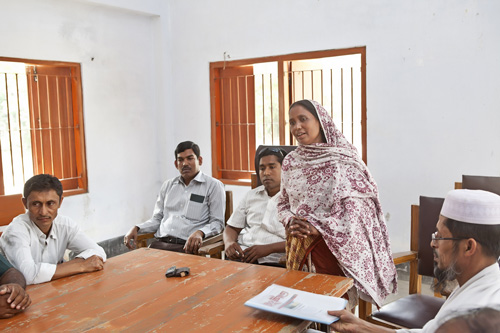
27 April 2014, Dhaka. BRAC has been listed number 32 in the 2013 Global Go To Think Tank Index report by the University of Pennsylvania. BRAC secured this position in the category of social policy as the first organisation from South Asia amongst 50 countries worldwide. The list includes Brookings Institution, Urban Institute, RAND Corporation and Fraser Institute.
The Think Tanks and Civil Societies Program (TTCSP) at the University of Pennsylvania conducts research on the role that the policy institutes play in governments and civil societies around the world. TTCSP examines the evolving role and character of public policy research organisations. Over the last 25 years, the TTCSP has developed and led a series of global initiatives that have helped bridge the gap between knowledge and policy in critical policy areas that improve policy making while strengthening democratic institutions and civil societies around the world. The TTCSP works with leading scholars and practitioners from think tanks and universities in a variety of collaborative efforts and programmes, and produces the annual Global Go To Think Tank Index that ranks the world’s leading think tanks in a variety of categories.
To know more please visit: http://gotothinktank.com/the-2013-global-go-to-think-tank-index-ggttti/
BRAC USA contributes $1.25 million to Bangladesh garment workers
The organisation’s Bangladesh Humanitarian Fund seeks donations from individuals, corporations and foundations for further support. Click here to donate directly to the Fund.
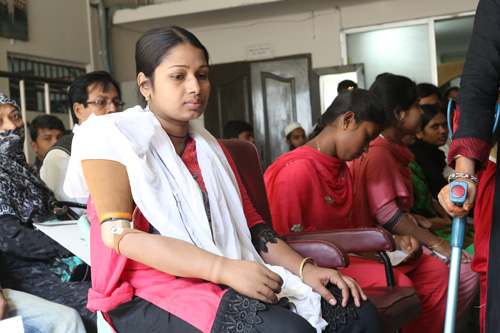
22 April 2014, New York -- The Bangladesh Humanitarian Fund, an initiative of BRAC USA, announces a grant of $1.25 million to create employment opportunities and secure sustainable futures for 250 garment workers from the Rana Plaza factory complex, which collapsed last year near Dhaka, Bangladesh.
BRAC USA is seeking additional donations to this fund. “Rana Plaza was like Bangladesh’s 9/11,” says Susan Davis, president and CEO of BRAC USA. “Those who died on April 24 did so working in dangerous conditions to provide a better future for their families and make our own clothing more affordable. For those still grieving, there's nothing that can offset the loss of their loved ones. But we can and should show our solidarity with those who survived.
“We're grateful to those who have contributed to the Bangladesh Humanitarian Fund so far, and welcome these contributions as a crucial first step,” Davis adds. “But more is needed. We ask individuals, corporations and others who have benefited from the hard work of Bangladeshi garment workers to challenge themselves to give more.”
The grant issued this month is the second of the Bangladesh Humanitarian Fund, which BRAC USA created in March as a part of renewed push for Bangladesh garment workers in the run-up to the one-year anniversary of Rana Plaza, which collapsed on April 24, 2013, killing more than 1,100 people.
Services provided to former Rana Plaza workers will include livelihood training, professional development, entrepreneurship training, assistance with access to employment, and personal counseling support. Services will be provided by BRAC, the global development organisation based in Bangladesh, of which BRAC USA is an independent North American affiliate.
The grant comes closely after the Bangladesh Humanitarian Fund’s first grant in late March, a $2.2 million donation to the Rana Plaza Donors Trust Fund, which supports victims of the Rana Plaza disaster and their families. BRAC USA’s Bangladesh Humanitarian Fund seeks to address victim needs and garment worker safety concerns in part by contributing a portion of every gift to the Rana Plaza Donors Trust Fund, established in November 2013 by a multi-stakeholder coalition with the International Labor Organisation serving as neutral chair.
“Bangladesh has seen significant gains in living standards, halving poverty rates in the last 20 years, thanks largely to women’s empowerment. The garment industry has played a tremendous role in this,” said Sir Fazle Hasan Abed, founder and chairperson of BRAC, last month when the Bangladesh Humanitarian Fund was announced. “But these gains will mean little if we allow tragedies like Rana Plaza to continue. The words ‘Made in Bangladesh’ should be a mark of pride, not shame.”
BRAC’s involvement in Rana Plaza relief began in the immediate hours after the building’s collapse, when first-response medical teams from BRAC’s health, nutrition and population program worked alongside the Bangladesh Army’s medical teams at the site. Later, staff and counselors from BRAC, BRAC University and Dhaka University provided psychosocial support to 473 survivors and victims’ families. The BRAC Limb and Brace Center in Savar, the Dhaka subdistrict in which Rana Plaza was located, provided braces to 29 survivors with spinal injuries and prosthetic limbs to an additional 12 survivors.
With support from others, BRAC will continue to provide financial support, livelihood training, seed capital and apprenticeship training to hundreds more victims. Meanwhile, working with other stakeholders, including retailers, government, trade unions and factory owners, BRAC is advocating for a long-term solution to Bangladesh worker safety issues.
BRAC USA welcomes additional contributions from individuals, corporations and foundations. Walmart, Asda, Walmart Foundation, The Children’s Place, Gap Foundation, VF Foundation and others, including many individuals, have already made initial contributions. Donations to the Bangladesh Humanitarian Fund will be directed to three specific program areas: support for the Rana Plaza Donors Trust Fund, continued support for BRAC’s work to provide counseling and rehabilitation to garment workers, and a reserve that can be used to support a “social safety net” for workers impacted by other tragedies.
All gifts to the Bangladesh Humanitarian Fund are tax-deductible in the United States and will be administered by BRAC USA, an independent 501(c) 3 charitable organisation registered in New York State, with fiduciary responsibility resting with its board of directors.
More...
Join the world’s biggest family




